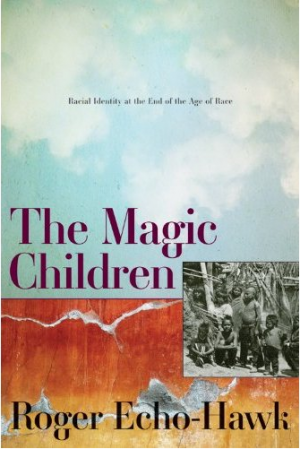The Magic Children: Racial Identity at the End of the Age of Race

“I used to think that I was Indian. The world was filled with magic children, living in America under the spell of race. But one day I learned that racial identity was just something to imagine about myself, and I devoted several years of careful thought on the matter. Then shortly, before that century turned into this one, before the old millennium became a young one, I decided to give it up.” —Roger Echo-Hawk, The Magic Children
So begins Roger Echo-Hawk’s exploration of the deconstruction of race in his personal account of identity, ultimately ending with his abandonment of the concept of race. He examines the fact that race has been scientifically discredited by biologists, geneticists, and anthropologists yet society continues to allow the idea of race to thrive. Echo-Hawk emphasizes that race is an inherently dehumanizing concept therefore; racial identity must be rejected in order to embrace a larger acceptance of humanity. “Race tells us a lie—a lie that defaces the true nature of humanity,” Echo-Hawk notes. The concept of race is oversimplified in order to categorize people (or divide) without considering the complex uniqueness of heritage.
Echo-Hawk’s journey into his past and an exploration of his mixed heritage of being White, Indian, and Mexican shapes The Magic Children. These terms reflect on his life once early childhood teaches him a lesson that follows him throughout the course of his adulthood: that he is viewed differently because of his “race” (essentially, the color of his skin). Roger Echo-Hawk questions terms like Mexican (as it reflects national citizenship and not race) as well as Hispanic (as it implies ethnicity and culture but not race). His separation of racial identity is not as complex as the ideology of race as Echo-Hawk carries us through his lifetime in an array of short stories that leads the reader to an understanding of how race has affected his life. These interweaving stories include young Echo-Hawk as a schoolboy, throughout his hippie and college years and later on his reflection on life changing moments. As a student who has participated in programs that assists minority students with funding, Echo-Hawk’s analysis of being an “Indian” in Boulder, Colorado was personally profound to me as it depicted the way in which the education system continues to utilize race negatively. For instance, the rejection of race can have severe repercussions. Hypothetically, a minority student who abandons the idea of “race” and does not fit the standards for funding based on under-representation in a certain field faces the risk of being excluded from assistance that may be vital to their future successes.
The urge to integrate one’s journey with Echo-Hawk’s is inevitable. His understanding, acceptance and the freedom that he has found with embracing the non existence of a racial identity is almost ideal. Echo-Hawk encourages the reader to step outside of one identity and explore not just the various complex identities that reside in all of us but also the identities that are assigned to us by outsiders. The Magic Children is a journey of recognizing those differences as an external factor and uniting to demobilize race by denying it the power to construct our social realities. Everyone’s journey is different, the process of being under the “spell” of race is complex but the ability to free oneself from the confines of a label that segregates humanity is in itself the magic that will help us all move beyond racial identity.